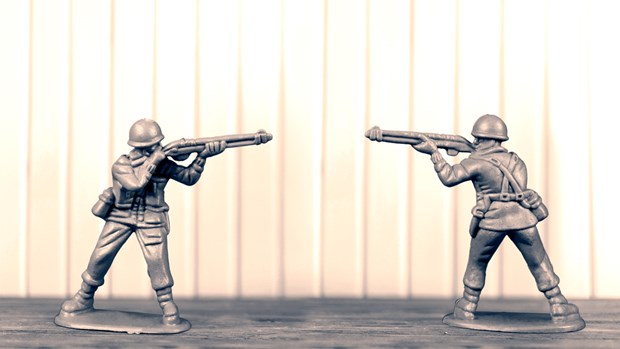
There are people I cannot bear to love. Rage springs up afresh in me when I think of those who spew racist hatred, or sexually exploit children, or commit acts of terrorist violence. The desire to hate also wells up within me toward people who’ve committed less extreme but equally infuriating acts against people I love—betrayers, liars, bullies, critics.
I could easily justify that instinctive desire to hate. For I hate evil—and it’s just a small step from hating evil to hating the bearers of evil.
But this is where Jesus confronts me: “You have heard that it was said, ‘Love your neighbor and hate your enemy.’ But I tell you, love your enemies and pray for those who persecute you” (Matthew 5:43–44, NIV).
What does this call to love mean in the face of ISIS or the man on the sexual predators list down the street? What does this mean for the person who’s betrayed and cheated a loved one or the teen who’s bullied your child?
Does this mean drumming up patently false warm feelings or gritting our teeth as we will ourselves to push back hateful reactions? The will certainly plays a part as we assent to Jesus’ teaching. But there is a deeper idea that can help us grapple with and grow into this radical call. We find it in Genesis 1:27: “God created human beings in his own image. In the image of God he created them; male and female he created them.”
This reality of the imago dei—that each of us, friends and enemies alike, are made in God’s image—calls us to recognize an innate worth that cannot be erased by any evil action. Here is the truth: That evil-bearer? He or she is also an image-bearer. And this has far reaching implications for each of us.
I invited several women I know to share their own thoughts on how Scripture’s teaching on the image of God challenges us to truly love our enemies, and this is what they said:
• It roots out our prejudices. “If all people are made in the image of God and yet we see a particular group of people as an enemy or as someone to fear, then we need to ask why. What are we afraid of?” Sandra Maria Van Opstal observes. This teaching challenges believers to wrestle with how fear may be “causing us to dehumanize other people.”
• It forces us to face ourselves. For Patricia Raybon, loving enemies means “seeing them as I am—broken, confused, messed up, hurting, struggling.” For example, she says, “I can pray for the poor lost souls of ISIS because they are, indeed, lost. As I am lost—on my worst days for certain. . . . They need Jesus just as I need Jesus.”
• It calls us to grapple with the extraordinary gospel. “To love our enemy is to believe that no one is beyond the grace of God—that every single human being is on the same footing before God as sinners. It is only through Jesus’ death and resurrection that we are able to be reconciled to him,” Jenny Yang asserts. “We should view our enemies as people not just made in the image of God but also potential instruments God can use for his glory.”
• It invites us to live out our true calling. “To love our enemies we must learn to see them as image bearers . . . But first we must learn to see ourselves as image bearers,” Hannah Anderson says. “When I remember that my core calling is to show what God is like and do what he would do, it fundamentally changes how I respond to my enemies because I remember how God responded to me when I was his enemy.”
Understanding—deep, deep down—that we are all made in God’s image has implications not just for how we view and treat enemies, but for so many other aspects of how we view ourselves and relate to others. In our TCW cover story “Black Women and the Imago Dei,” Austin Channing Brown examines how this truth impacts one’s sense of cultural and ethnic identity. And in “Dear Parents of a Child with Special Needs,” Micha Boyett explores how the imago dei interweaves through her love for her son who has Down syndrome.
Recognizing the imago dei in my enemies doesn’t magically erase negative feelings that arise, but it does forcibly reorient my perspective—away from my feelings and onto the Cross. Thank the Lord that, as Romans 5:10 says, “Our friendship with God was restored by the death of his Son while we were still his enemies”!
Terrorist, abuser, adulterer . . . sinner. Our indelible, God-given dignity remains. For we each are made in his image—and that will never change.
Grace,

Read more articles that highlight writing by Christian women at ChristianityToday.com/Women
 Read These Next
Read These Next

 What Every Leader Can Learn from Pope John Paul IIThe first step to extraordinary leadership
What Every Leader Can Learn from Pope John Paul IIThe first step to extraordinary leadership










 Homepage
Homepage

